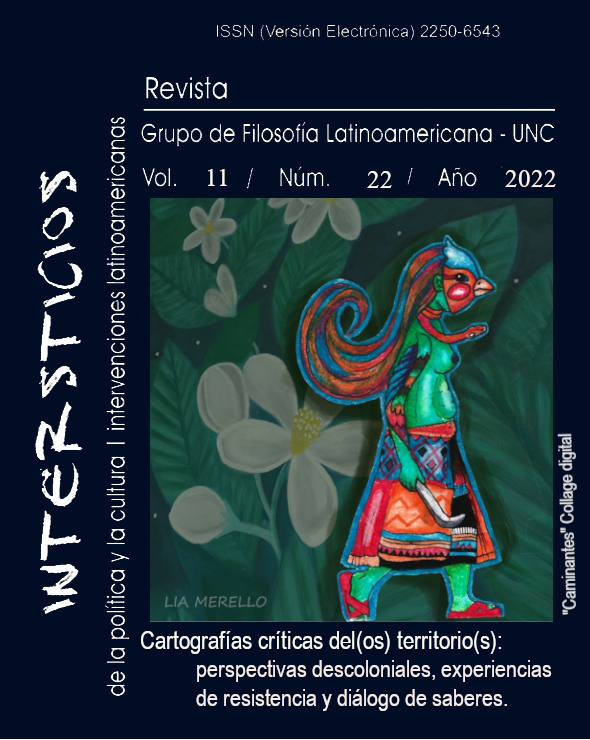Identity and landscape. Decolonial approach to rethink identities in Cordoba territory
Keywords:
Territory, Identity, Landscape, Community, DecolonizeAbstract
Based on the experiences lived in different territories, the author in the following article seeks to critically address the construction of identities in the territory today called Córdoba and its relationship with the landscape, its configuration, use and utility for the maintenance of a Eurocentric hegemonic thought. . We will find different perspectives starting from the civilizational matrices, the construction of fictions, the ethnophageal processes, among other colonizing dynamics that exist and are installed in the thought and status quo of society. The tour invites you to reflect on these processes of construction of landscapes that are for many the identification of the Cordovan territory. From the cosmovivencia of the murals in the Villa El Tropezón, walking through the indigenous identities, the problems that configure being in the territory are shown. Like the construction of a highway, it modifies the landscape, the identity. Questions are proposed that can bring about a turning point in the dialogue that can build identities from critical thinking, recognizing the ancestry of the territory (Córdoba), the community as the axis and the living energies that inhabit it.
Downloads
References
Barilá, María Inés; Fabbri, Sonia Beatriz y Amoroso, Sergio Andrés (2008), Jóvenes escolarizados: Entre la sujeción y la transgresión a la norma. V Jornadas de Sociología de la UNLP, 1-15. Universidad Nacional de La Plata. Facultad de Humanidades y Ciencias de la Educación. Departamento de Sociología, La Plata. Recuperado de : https://www.aacademica.org/000-096/382.pdf
Boito, María Eugenia (2017). Estar juntos/estar separados en el escenario urbano cordobés actual. Inmediaciones de la Comunicación, 12(1), 215-239. Recuperado de: http://hdl.handle.net/11086/5677
Castro Gómez, Santiago (2000) Ciencias sociales, violencia epistémica y el problema de la "invención del otro". Lander, Edgardo (comp.) La colonialidad del saber: eurocentrismo y ciencias sociales. Perspectivas latinoamericanas (pp.139-155). Buenos Aires: CLACSO.
Colectivo de Fotografxs y Muralistas Villerxs Lxs Wachxs del Trope (2018). Recuperado de: https://www.facebook.com/loswachosdeltrope
Dussel, Enrique (1994). Crítica del “Mito de la Modernidad”. En 1492. El encubrimiento del otro. Hacia el origen del “Mito de la Modernidad”. La Paz-Bolivia: Plural Editores.
Ellsworth, Elizabeth (1999). “¿Por qué esto no parece empoderante?”. Belausteguigoitia, M. y Mingo, A. (Eds.) Géneros Prófugos, Feminismo y Educación (pp. 55-88). México: U.N.A.M.
Escolar, Diego (2008). El “estado del malestar”. Movimientos indígenas y procesos de desincorporación en la Argentina: el caso Huarpe. Briones, C. (Comp). Cartografías argentinas: políticas indígenas y formaciones provinciales de alteridad (pp. 39-66). Buenos Aires: Antropofagia.
Han, Byung Chul (2017). La expulsión de lo distinto, Madrid: Herder Editorial.
Harvey, David (2005), El nuevo imperialismo, acumulación por desposesión. Socialist Register, 99-129. CLACSO. Recuperado de: http://www.biblioteca.clacso.edu.ar/clacso/se/20130702120830/harvey.pdf
Leyes N° 23302 y 26209. Argentina, 11/06/2019. Recuperado de: https://www.diputados.gov.ar/proyectos/proyecto.jsp?exp=2957-D-2019
Llorens, Santiago. (2017). Nacimiento del paisaje en Córdoba Afirmaciones y ambivalencias de un cordobesismo paisajero demasiado estrecho. Cardinalis, (9), 130–156. Recuperado de: https://revistas.unc.edu.ar/index.php/cardi/article/view/18940
Manifiesto de la Primera Caminata de los Pueblos Indígenas de Córdoba (2021). Recuperado de: https://www.facebook.com/Caminata-De-Los-Pueblos-Ind%C3%ADgenas-De-C%C3%B3rdoba-101513182275049
Mignolo, Walter (2003). El pensamiento des-colonial, desprendimiento y apertura: un manifiesto. Revista Telar (6), 7-38.
Land Nick (2009,). Hipersticion -CCRU- Materia Oscura editoril. Recuperado de Hyperstition" Delphi Carstens interview Nick Land. https://materiaoscuraeditorial.com/filosofia/hipersticin
Pachilla, Pablo (2014). La figura del monstruo en la ontología de la diferencia. V Jornadas de Reflexión Monstruos y Monstruosidades. Ciudad Autónoma de Buenos Aires
Quijano, Aníbal (1992). Modernidad, identidad y utopía en América Latina. Quito: El Conejo.
Quijano, Aníbal (2000). Colonialidad del poder, eurocentrismo y América Latina. Lander, Edgardo (comp.) La colonialidad del saber: eurocentrismo y ciencias sociales. Perspectivas latinoamericanas (pp. 777-832). Buenos Aires: CLACSO.
Quijano, Aníbal (2011). La colonialidad del poder y la experiencia cultural latinoamericana. Briceño-León, R. y Sonntag, H. (Eds.), Pueblo, época y desarrollo: la sociología de América Latina. Caracas: CENDES, LACSO, Nueva Sociedad.
Quijano, Aníbal (2014). Colonialidad del poder, eurocentrismo y América Latina. Lander, Edgardo (comp.) La colonialidad del saber: eurocentrismo y ciencias sociales. Perspectivas latinoamericanas (pp. 201-246). Buenos Aires: CLACSO. Recuperado de: http://biblioteca.clacso.edu.ar/clacso/se/20140507042402/eje3-8.pdf
Restrepo, Eduardo y Rojas, Axel (2010). Inflexión decolonial, fuentes, conceptos y cuestionamientos. Colección Políticas de la alteridad. Instituto de Estudios Sociales y Culturales Pensar Maestría en Estudios Culturales, Universidad Javeriana Editorial Universidad del Cauca.
Segato, Rita (2015). La crítica de la colonialidad en ocho ensayos. Y una antropología por demanda. Buenos Aires: Prometeo libros.
Zibechi, Raúl (2015): Descolonizar el pensamiento crítico y las prácticas emancipatorias. Bogotá: Desde Abajo.
Downloads
Published
Issue
Section
License

This work is licensed under a Creative Commons Attribution-NonCommercial-ShareAlike 4.0 International License.
Authors who have publications with this journal agree to the following terms:
a. Authors will retain their copyright and grant the journal the right of first publication of their work, which will simultaneously be subject to the Creative Commons Attribution License that allows third parties to share the work as long as its author and first publication in this journal are indicated.
b. Authors may adopt other non-exclusive license agreements for distribution of the published version of the work (e.g., deposit it in an institutional telematic archive or publish it in a monographic volume) as long as the initial publication in this journal is indicated.
c. Authors are allowed and encouraged to disseminate their work through the Internet (e.g., in institutional telematic archives or on their web page) after the publication process, which may produce interesting exchanges and increase citations of the published work (see The effect of open access).


